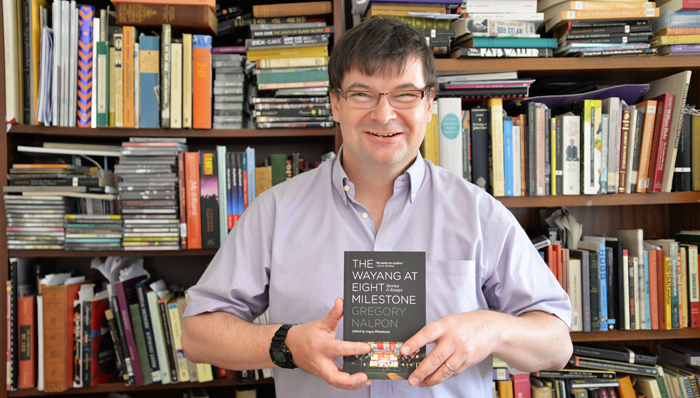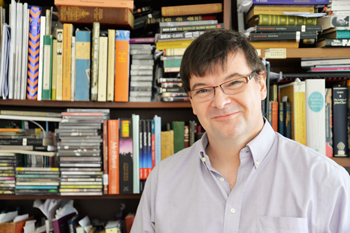Young Children’s Voices in Mathematical Problem Solving
Contributed by Dr Ho Siew Yin and Sng Wei Qin Abbie, from NTUC First Campus, for SingTeach Virtual […]
Read More
What was it like to live in Singapore during the 1950s to 70s? Dr Richard Angus Whitehead found out through reading the works of a forgotten Singapore writer. We talk to him about how literature nurtures the imagination and brings us back in time.

More than just a source for entertainment, books can connect us to the past, to distant lands and to other people. Reading excites the imagination and lets us look at the world from different viewpoints.
Just ask Dr Richard Angus Whitehead. A big fan of reading, his imagination was stirred when he chanced upon the short story “The Rose and the Silver Key” by Gregory Nalpon (1938–1978), a Singapore writer.
In fact, Angus was so moved by it that he decided to uncover Nalpon’s lost writings and compile them into a book, The Wayang at Eight Milestone.
“I was genuinely interested in compiling the book and felt quite passionate about this,” he says.
“Nalpon’s writing is such a breath of fresh air and so accessible compared to others. A lot of Singapore writing is very worthy but I’m not sure if they light my candle as much, so to speak.”
He shares with us his experience of reading Nalpon’s stories about Singapore and how such works of literature help us to better understand our past.
I think he must have known while he was writing in the 1960s and 70s that Singapore was changing. I think he was really trying to capture something about the life he was experiencing. But he could only do that by being controversial. You can’t necessarily be a great writer if you are merely sitting in your classroom or your ivory tower and having wonderful thoughts or reading books.
I think the reason why people like Shakespeare is because “they licked a few pavements”, to quote the 1970s underground artist Captain Beefheart. And Nalpon licked a few pavements. He actually went out on the streets of Singapore and lived that life, and that comes out in the stories. There’s a sense in which he’s physically engaging with Singapore.
I think he just had this genuine interest in connecting with people and that’s something I find very refreshing. His stories sound so vivid and so linked to life and everyday people in Singapore. He seemed to be able to connect without any problems, and actually represent and describe people of all different groups in an equal way. You’ve got Chinese, Malay, Indian, Eurasian, and they’re all mingled. I get a sense, as a person originally from another country, what it was like in the kampong (Malay for village) to some degree. It’s exciting that Nalpon is representing, in such a positive way, the Singaporean People without privileging or neglecting any particular racial group.
He (Nalpon) actually went out on the streets of Singapore and lived that life, and that comes out in the stories. There’s a sense in which he’s physically engaging with Singapore.
– Angus Whitehead, English Language and Literature Academic Group
He was genuinely engaged with people. There is a great story of how when he was about 15, there were floods in Singapore in the 1950s. He just got out of bed went to help some Chinese pig farmers to rescue the pigs that were drowning. So that thing about getting mucked in and helping your neighbours is quite refreshing – it’s a different world.
For me, it’s quite important to discover writers like Nalpon because if you don’t, you’re only going to have a partial picture of the Singapore story. What we really should be talking about is the multiplicity of personal Malay, Chinese, Indian, Eurasian and Other Singapore stories.
I feel very privileged. Here in Singapore, we live in an unprecedented time for literature. There seems to be more books being published than ever before in Singapore. I’m not sure that we’ve reached a situation yet where we’ve got HDB poets who are producing great literature. But I’m very optimistic. I think Singapore is often accused of not having an imagination but it’s very clear that there is one. Perhaps it needs to be nurtured and enhanced, and people need to be given more chances to publish.
 A student of mine just read Moll Flanders – a text written far away from Singapore 300 years ago – for one of my classes. She said that it was initially hard for her, but once she got acclimatized, she found that language was used so beautifully. It’s so accessible, just the turn of phrases, the weird and wonderful things. As an ageing “ang mo” educator who after almost 7 years in Singapore, still can’t even pronounce “Geylang” properly, that’s a very gratifying thing to hear! Just to be reminded of the fact that literature can liberate us, harness the imagination and get us reading, thinking and writing, in new and different ways gives me hope for the future for literature in Singapore.
A student of mine just read Moll Flanders – a text written far away from Singapore 300 years ago – for one of my classes. She said that it was initially hard for her, but once she got acclimatized, she found that language was used so beautifully. It’s so accessible, just the turn of phrases, the weird and wonderful things. As an ageing “ang mo” educator who after almost 7 years in Singapore, still can’t even pronounce “Geylang” properly, that’s a very gratifying thing to hear! Just to be reminded of the fact that literature can liberate us, harness the imagination and get us reading, thinking and writing, in new and different ways gives me hope for the future for literature in Singapore.
A year ago, there were debates about the way that Literature (as a subject) has declined, mainly on a fallacy that students can’t do well in the subject. Now it’s been proven again and again that students are doing well. When you get students to read literary works, their response is so gratifying every time that it proves the point. I’ve even heard of a primary school teacher using Nalpon and the pupils seem to love the stories. So obviously, Nalpon’s not just intellectual stuff or just for adults to read. Good literature should be difficult, challenging, but should also be accessible and have an immediate impact upon its readers. Nalpon’s writing clearly does this.
Literature can almost be a sort of lifeline for students. I know of taxi drivers in Singapore who can quote whole speeches from Hamlet and Macbeth. In fact, the owner of Ethos books was here at NIE the other day and quoted to me from memory a long Byron poem. I was gobsmacked. How many of us can do that these days? And it’s not just that they can recite them, but these quotes obviously mean something to them. Literature is almost like a lifeline to the imagination, or something aesthetic.
If I didn’t have books to read, my head would be in trouble, especially I think in Singapore where there is less and less green to revive us.
– Angus on why reading is important to him
If I didn’t have books to read, my head would be in trouble, especially I think in Singapore where there is less and less green to revive us. Books, in a way, restore something within me every day. Stories, like Nalpon’s, can connect with the past. It’s connecting with something, for me, that is quintessentially Singaporean, even if it’s not so much there anymore.
It’s quite wonderful Nalpon was there and he was capturing what life was like in Singapore from the 1950s till the 70s. It’s lost now but perhaps it’s particularly important to get students or young people to read these stories, even if the stories are quite vicarious. They can in some ways connect with the past of Singapore, something real, something important.
Giving an alternative vision is quite important. People might say that when they read Nalpon, his stories don’t fit into the orthodox view of what Singapore should be. And I’m often accused of saying negative things as well. But I would say that we may sound negative only because we love Singapore so much. I’ve only been here for almost 7 years but I feel connected with the place. Literature provides an alternative view so we can have a conversation. That’s something that’s important as well for students.